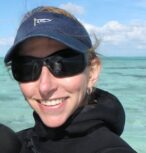DNA reveals the past and future of coral reefs
New DNA techniques are being used to understand how coral reacted to the end of the last ice age in order to better predict how they will cope with current changes to the climate. James Cook Univer

From 2005 to 2022, the main node of the ARC Centre of Excellence for Coral Reef Studies was headquartered at James Cook University in Townsville, Queensland (Australia)








Abstract: Humans have been harvesting predators and other creatures from the global oceans for millennia. More recently, conservation measures, such as marine reserves, have been established to restore populations depleted from this harvest. Both predator harvest and replenishment alter the top-down forces that predators exert on lower trophic levels over large spatial and temporal scales. This global-scale ‘experiment’ has led to a proliferation in recent years of research aimed at understanding how human alteration of predator populations shapes marine ecosystems. Two overarching pathways of cascading predator effects, known as trophic cascades, have been identified: lethal and risk-based. Striking examples exist of lethal trophic cascades caused by fisheries, where predator declines have caused increases in prey (e.g., herbivore) abundances and decreases in prey resources (e.g., algae). These examples have led to a general expectation that fisheries, and conversely marine reserves, may cause such changes. Conversely, only a few examples of risk-based trophic cascades due to fishing have been documented, yet a consensus is emerging that such effects should be common. We therefore synthesized existing data from a remote coral reef archipelago with a gradient of fishing pressure to explore whether lethal or risk-based trophic cascades are more likely to occur as a result of fishing. We found that overfishing can lead to distinct, cascading risk effects in natural ecosystems whose magnitude exceeds that of presumed lethal effects and likely accounts for previously unexplained findings. Most recently, we have explored if and how risk-based trophic cascades can fundamentally alter coral reef ecosystem structure. We found that this occurs over large spatial and temporal scales by affecting primary producer (e.g., algae and seagrass) distribution and, consequently, carbon storage. Our results collectively suggest that risk effects may provide a powerful lens through which to understand, document, and predict human impacts in oceans – from fisheries to climate change.
Biography: Dr. Elizabeth Madin is currently an Assistant Professor at the Hawai‘i Institute of Marine Biology (HIMB) within the University of Hawai‘i. Elizabeth first came to Australia on a Fulbright Scholarship to conduct pre-doctoral research at JCU (1999-2001) and was subsequently a Research Assistant at AIMS (2001-2003). She received a second Fulbright Fellowship to return to AIMS for collaborative work in 2007 and received her Ph.D. from the University of California, Santa Barbara in 2009. Most recently, prior to starting at HIMB, Elizabeth was based in Sydney, first as an US National Science Foundation International Postdoctoral Fellow at the University of Technology Sydney and later as an ARC DECRA Fellow at Macquarie University. Elizabeth’s research focuses broadly on the intersection of human impacts and animal behaviour and how this interface can lead to cascading effects through food webs. As part of this work, she is currently leading a project investigating whether application of remote sensing tools to this area can be used as the basis for a freely-available conservation tool for assessing marine reserve effectiveness and fisheries impacts on coral reefs throughout the world.
Website: www.oceansphere.org
New DNA techniques are being used to understand how coral reacted to the end of the last ice age in order to better predict how they will cope with current changes to the climate. James Cook Univer
A new study on the effects of climate change in five tropical countries has found fisheries are in more trouble than agriculture, and poor people are in the most danger. Distinguished Profess
James Cook University researchers have found brightly coloured fish are becoming increasingly rare as coral declines, with the phenomenon likely to get worse in the future. Christopher Hemingson, a
Researchers working with stakeholders in the Great Barrier Reef region have come up with ideas on how groups responsible for looking after the reef can operate more effectively when the next bleaching
Abstract: As marine species adapt to climate change, their heat tolerance will likely be under strong selection. Individual variation in heat tolerance and its heritability underpin the potential fo
Abstract: The Reef Ecology Lab in KAUST’s Red Sea Research Center explores many aspects of movement ecology of marine organisms, ranging from adult migrations to intergenerational larval dispersal
Abstract: Macroalgal meadows are a prominent, yet often maligned component of the tropical seascape. Our work at Ningaloo reef in WA demonstrate that canopy forming macroalgae provide habitat for ad
Abstract: Sharks are generally perceived as strong and fearsome animals. With fossils dating back at least 420 million years, sharks are not only majestic top predators but they also outlived dinosa
Abstract: Connectivity plays a vital role in many ecosystems through its effects on fundamental ecological and evolutionary processes. Its consequences for populations and metapopulations have been
Abstract: Evolution of many eukaryotic organisms is affected by interactions with microbes. Microbial symbioses can ultimately reflect host’s diet, habitat range, and even body shape. However, how
Abstract: The past few years have seen unprecedented coral bleaching and mortality on the Great Barrier Reef (GBR) but the consequences of this on biodiversity are not yet known. This talk will expl